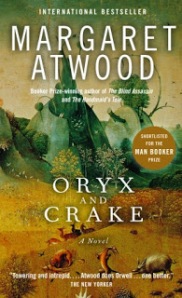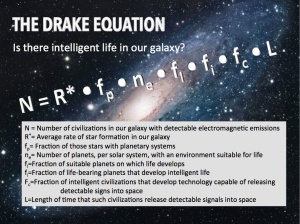Now onward.
***
Monsters to the Left of Us...
After Part 14, which discussed the obsessive neoconservative campaign against science and modernity, can we take it that the Enlightenment is principally under attack from the "right"?
Far from it! Let's take another example of this all-out reactionary frenzy, this time from the political "left."
 Michael Crichton's apparent polar opposite would seem to be Margaret Atwood, the doyen of feminist fiction and well-known for her attacks on the white-male-financier power structure, in both fiction and polemical nonfiction. Oryx and Crake, Atwood's latest novel, portrays yet another world devastated by human greed, incompetence, and brutish oppression, this time nearly denuded of human life by scientific innovations gone awry.
Michael Crichton's apparent polar opposite would seem to be Margaret Atwood, the doyen of feminist fiction and well-known for her attacks on the white-male-financier power structure, in both fiction and polemical nonfiction. Oryx and Crake, Atwood's latest novel, portrays yet another world devastated by human greed, incompetence, and brutish oppression, this time nearly denuded of human life by scientific innovations gone awry. Of course this is a familiar premise and one that I have used myself. Indeed, there is nothing wrong with some vivid extrapolative exaggeration in trying to make a point. The greatest 'self-preventing prophecies' have done it by showing how much we'd lose "if this goes on."
And yet, this motif can also become hackneyed, cliched, even a crutch. For example, nearly all feminist science fiction tales seem to begin with a scenario based on some (literally) manmade catastrophe. One can easily see why. The End of the World is such a bad thing - the very worst thing - that it offers a moral excuse for any author to pour opprobrium upon whole types who might be assigned blanket group-culpability. A neat trick, since you aren't really supposed to judge people in straw-man type-categories.
But that's what romantics inherently do, whether their particular ire is aimed left or right, at all commies or all capitalists or at all males. (See my article on Tolkien and the Modern Age) Romanticism is about one side being pure and good while the opposition is all-bad. And the attraction of this way of thinking is clear. Indignation feels good! It's lovely to disdain your opponents as-a class that is inherently immoral.
But even when your worldview officially promotes poilitically-correct hypertolerance? One way around this bind is to portray the enemy class (males, plutocrats, whatever) as all-powerful, and determined to bring about the end of the world.
(I expect grief from these paragraphs, so let me say very clearly that I consider myself to be a feminist and have written my own feminist utopia, Glory Season. Moreover, creating a cliched world holocaust and then assigning venal blame to conspiring corporate lords can seem less preposterous than Michael Crichton's recent attempt to call ecological activists the Great Illuminati! Here my criticism of the standard feminist fictional scenario is not aimed at the surface agenda of universal tolerance and opportunity - of which I deeply approve - but at a nasty undercurrent that many authors may not even be aware of.)
As part of this tradition, Oryx and Crake doesn't hold back. One of the book's key themes is the corrupting influence of commerce on science. When business interests dominate "you enter a skewed universe where science can no longer operate as science," Atwood says.
The book takes this to extremes. For example, biotech company HelthWyzer puts "hostile bioforms" into vitamin pills while at the same time marketing antidotes. "The best diseases, from a business point of view," the author writes with irony, "would be those that cause a lingering illness."
And it all goes to hell from there. Talk about a penalty for man's arrogance! The destruction of all art, all love, all hope. This is portrayed as the ultimate and likely outcome if we continue plunging forward with our insolent program of meddling with Nature's wisdom.
The crux: science cannot be trusted. Not while money or competition or self-interest are involved. (In other words, not while we are human.) Not anywhere as well as certain self-appointed artistic-elite guardians of Truth.
In effect, this is exactly the same lesson as that preached by Michael Crichton. Except replace "artistic" with "aristocratic." (The words even sound similar.)
 Till now, I'd wager very few critics have even typed the names Michael Crichton and Margaret Atwood in the same article, let alone calling them allies and co belligerents in the same cause. And yet, having come this far in a lengthy essay, the reader can now see why I present them, side-by-side. True, they have probably never supported the same politicians, and never will. Their particular choice of villains will always be surficially different; so will their heroes and heroines. But those are superficialities and distractions.
Till now, I'd wager very few critics have even typed the names Michael Crichton and Margaret Atwood in the same article, let alone calling them allies and co belligerents in the same cause. And yet, having come this far in a lengthy essay, the reader can now see why I present them, side-by-side. True, they have probably never supported the same politicians, and never will. Their particular choice of villains will always be surficially different; so will their heroes and heroines. But those are superficialities and distractions. Indeed, this pair of authors show countless eerie parallels. Both claim relentlessly, and rather defensively, to be pro-science. Crichton avows a scientific education while Atwood often refers to her father and brother, biologists of some prominence. Both Crichton and Atwood mourn that modern science is relentlessly corrupted by corrupt interests that destroy its credibility. Even the unscrupulous conspiracies are remarkably similar, differing only in the cosmetic surfaces that distinguish left-wing authoritarian bogeymen from right-wing authoritarian bogeymen.
Both offer doomsday scenarios that arise almost entirely because of secrecy that stifles the natural corrective, error-prevention of open accountability in a free, democratic and scientific society.
And yet they never call secrecy the culprit, per se.
No, it is always hubris.
Dig down, and you will find that these authors, and a myriad others like them, tap the mythic current described by Joseph Campbell. A river of tradition, nostalgia and fear of the future that watered nearly all of the great literature in our tortured past, from Homer and Murusaki to Joyce. A despairing sense of loss. A belief in eternal verities and traditional values under threat. The rightful superiority of a wise or all-knowing class. A sense that the past knew better and that today's citizens cannot be trusted with bold new tools to "improve" the world. To improve their children and themselves.
Don't be distracted by minor differences. While lefty postmodernists express contempt for money-polluted, power-driven science in principle, Crichton and his neoconservative friends rail against what they perceive as a liberal-activist tilt on the part of the modern scientific community in practice, proclaiming that humanity's smartest and best trained minds -- the entire vast and amorphous marketplace of skilled scientific competitors -- have been polluted and discredited by outrageously unprofessional mysticism and consensual bias.
These two positions are seldom laid side-by-side. The common aim of antimodernists - both neoconservative and ultraliberal - is to discredit the process and credibility of science itself, a process that benefits from relentless criticism of specifics , but that is undermined by broadbrush general condemnations, hurled without supporting analysis from fanatical extremes of both left and right.
...on to Part 16... how it spreads outward from the arts...
.


![Prey [Hardcover]-Michael Crichton](http://davidbrin.files.wordpress.com/2013/12/prey-hardcover-michael-crichton.jpg?w=194)



 The lesson for everyday life? If none of us are likely to catch our own mistakes, we can hope that others will catch them for us. And yes, even when eagerly rebellious, snotty graduate students do the catching. (Even Nobelists relearn this lesson, the hard way. There is no privileged safety from criticism, in science, though some Cro Magnon professors and laureates certainly do try.)
The lesson for everyday life? If none of us are likely to catch our own mistakes, we can hope that others will catch them for us. And yes, even when eagerly rebellious, snotty graduate students do the catching. (Even Nobelists relearn this lesson, the hard way. There is no privileged safety from criticism, in science, though some Cro Magnon professors and laureates certainly do try.)






